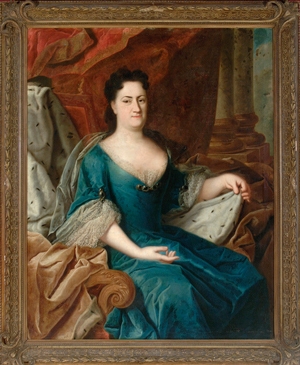When King George I came over from Hanover in 1714 to claim the crown he had inherited from his distant cousin Queen Anne, he was accompanied by his mistress of more than 20 years, Melusine von der Schulenberg. George’s wife Sophia Dorothea was left behind in Germany. She had made the mistake of taking a lover of her own not long after George had embarked on his affair with Melusine, forgetting that by the double standard that then prevailed in courts, it was acceptable for a man to have mistresses, ‘but shameful indeed to be a cuckold’.
Sophia Dorothea had flaunted her infatuation with the glamorous adventurer, Count Konigsmark, and wildly compromising letters between the pair were intercepted. In July 1694 Konigsmark had disappeared on his way to an assignation with Sophia Dorothea, having almost certainly been murdered on the orders of George’s father. Soon afterwards George had divorced his wife and imprisoned her for life in a remote castle.
On his arrival in England, George’s domestic arrangements naturally became the focus of much interest. Melusine brought with her the three daughters she had borne him, although to preserve appearances George never admitted having fathered them, and instead they were styled Melusine’s ‘nieces’. Ill-disposed persons professed outrage at George’s maltreatment of his ‘beautiful and innocent wife’, while few could understand what he saw in the scrawny Melusine.
There was also a widespread misconception that George had brought a second mistress to England, Sophia Charlotte von Kielmansegg, and that the King divided his affections between the two women. In fact Sophia Charlotte was his illegitimate half-sister, and it is probably untrue that George had an incestuous relationship with her, but the ladies’ strong dislike for one another reinforced the idea that they were rivals.
Having settled in their new home, Melusine and her compatriots soon made themselves unpopular by their readiness to sell titles and offices to the highest bidder. There were complaints that this ‘German cabal’ was ‘sucking England dry’, and Sir Robert Walpole reportedly remarked that Melusine was ‘so venal a creature that she would have sold the King’s honour for a shilling’. The account books of the Duke of Chandos, recording payments of £9,500 to Melusine over a five-year period, indicate the kind of profits she made from bribery.
The appalling financial crash of 1720 shone an unwelcome spotlight on court corruption. During its boom years, the South Sea Company had not only given Melusine large quantities of stock, but paid £10,000 for her ‘good offices in bending the King’s ear’ to favour the company’s schemes. When the company’s value plummeted, bankrupting thousands, the country erupted in fury. If Melusine’s full role in the scandal had been exposed, the monarchy could have been overthrown.
After admitting dishonesty to a parliamentary select committee, Robert Knight, treasurer of the South Sea Company, fled the country to avoid naming individuals. Another company official gave damaging testimony implicating Melusine, but he lacked Knight’s detailed knowledge of wrongdoing. The government’s attempts to extradite Knight from France came to nothing after Melusine privately alerted a French diplomat that the King did not want the application to be granted. Consequently Knight remained out of reach of the authorities, and Melusine was safe, even if widely reviled.
From the historian’s point of view Melusine was in some respects a frustratingly discreet woman. No letters between her and her royal lover survive, and because the unsociable King liked to shut himself away from his courtiers’ gaze, little is known about their private life together. Claudia Gold has nevertheless skilfully mined the available evidence to provide a lively and informative account of Melusine’s career. In our own economically precarious times, when a public enquiry is investigating questionable links between politicians and a big business conglomerate, the section on the South Sea crash has an added topicality.
Despite a slightly regrettable tendency to jump about chronologically, Gold has produced a vivid and enjoyable biography that highlights the sympathetic side of Melusine’s character, while acknowledging the acquisitiveness and lack of scruple that made her so unpopular.






Comments